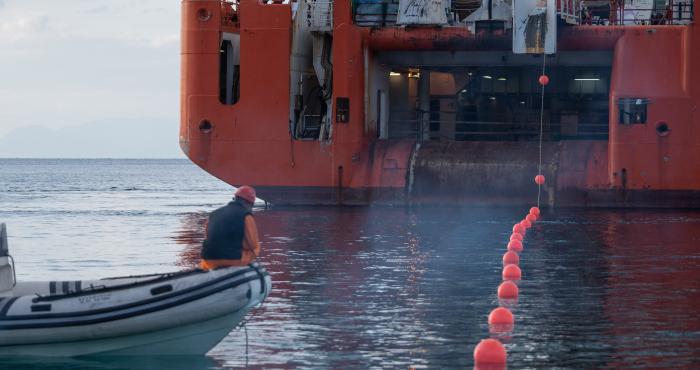A fierce row has erupted over the undersea electricity link between Cyprus and Crete, as Greece’s power grid operator on Tuesday warned it would halt work unless it gets millions of euros upfront from Cyprus.
The independent power transmission operator (Admie) is pushing Cyprus’ energy regulator Cera for immediate approval to recover costs it says it spent in 2023 and 2024 on building the cable.
Otherwise, Admie warned, it may suspend the project. Yet there is no official figure for how much Admie is demanding. Cypriot sources say the maximum payment Cyprus has committed to is €25 million per year.
President Nikos Christodoulides on Tuesday confirmed that the country will honour its funding commitment for the electricity interconnection project, despite the suspension of its works.
“The decisions taken by the Cypriot government concern a specific amount, let me remind you, it was 25 million for a five-year period, without, I want to clarify this because it is very important, burdening the Cypriot consumer. That will stand,” he said.
However, the president did not elaborate on why the interconnector works had been suspended, nor on the repayment arrangements regarding costs linked to the halt.
The rest of Admie’s expenses, and a capital return of around 8.2 per cent, would be passed on to Cypriot consumers through electricity bills only once the cable becomes operational.
When the two governments signed the agreement, Cyprus publicly stated that the first €25 million would be paid in January 2026. But Admie now insists on receiving that sum immediately.
It argues that there’s no written clause in the deal tying the first payment specifically to January 2026.
Meanwhile, Greece’s energy regulator RAAEY has said from this July, Greek consumers will start covering the costs Admie has incurred so far.
Even if Cyprus caves in to pressure and pays Admie the €25 million, or part of it, within weeks it’s unclear if this would ease Admie’s financial crunch. As Greece’s transmission operator, any financial trouble could severely damage Greek state interests.
Admie says it cannot keep funding the cable’s construction from its own pockets, particularly payments to Nexans, the French firm laying the cable on the seabed. Yet Admie also accepted, through the intergovernmental deal, that Cyprus would not fully cover all its costs during construction, except for the agreed annual sums.
The contract between Admie and Nexans for manufacturing and installing the cable alone is worth €1.4 billion.
Experts say it’s obvious that neither Cyprus’ planned payments nor Greece’s consumer contributions are enough for Admie to finish the project without raising more of its own capital. Admie claims it has already spent €120 million.
But neither Admie nor the European Commission has revealed how much of this came from a €658 million EU grant.
Admie argues that once Cyprus begins reimbursing costs, it will look more credible to lenders. It hopes banks will then provide loans to bridge the remaining funding gap.
However, there’s still no convincing answer from Admie or the Greek government on how lenders can be persuaded to finance a project stalled by geopolitical tensions. Turkey continues to block seabed surveys in international waters, claiming part of the area as its own continental shelf.
The European Commission has re-emerged in the dispute. Reports from the Greek website suggest Brussels may resume the intense pressure it applied in 2024, urging Cyprus to start paying Admie’s costs now.
A virtual meeting is expected in the coming days involving the two regulators, Admie and the Commission to discuss potential payments from Cyprus.
While there’s growing speculation that Nicosia might release part of the €25 million earmarked for January 2026, insiders say paying more than this amount remains highly unlikely. Any higher figure would spark political uproar and public backlash.






Click here to change your cookie preferences